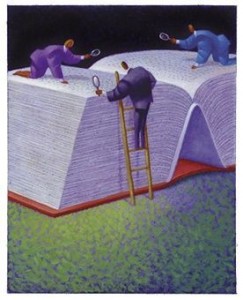 I’ve spent my day editing. This is a painful and time-consuming necessity for any piece of work a writer wishes to present to the literary public. I mean it. It’s necessary. Anytime I see a bio or book description in which the author claims to have written the book in a month and spent another month editing before publication, I cringe. There is almost no chance I will read that book.
I’ve spent my day editing. This is a painful and time-consuming necessity for any piece of work a writer wishes to present to the literary public. I mean it. It’s necessary. Anytime I see a bio or book description in which the author claims to have written the book in a month and spent another month editing before publication, I cringe. There is almost no chance I will read that book.
I fully believe that there are people out there who can write a book in a month. Look at NANO. I do not believe that there are many people who can adequately proofread and edit 200+ pages in a month. It should take that long to find the typos alone, and it pretty much rules out the use of a professional editor (which I recommend for a book destined for publication). Since it is such a difficult thing to do I thought I might share a few of the tips that I use. I don’t mean grammar tips, like avoid the dreaded passive voice or exile unnecessary adjectives to the foul recesses of the metaphoric rubbish heap, though those are obviously important. I mean the nuts and bolts of how to find those pesky errors lurking in every lengthy work.
Of course what works best for me is going to be different from what works best for you or anyone else. This is just my list in no particular order. I’d love to hear your tips too.
1. Give it time. Don’t expect to finish your first draft and then execute a quick fix before sending it off to print. Reading and rereading and then reading again takes time.
2. Step away. This too takes time, sometimes a lot of it. Put your novel in a drawer. Walk away from it for at least a few days, so that you can look at it with relatively fresh eyes. One of the hardest things to do is keep your brain from reading what it thinks it wrote as opposed to what is actually on the screen.
3. Use someone else’s eyes. Beta readers are your best friends. It doesn’t matter if it’s a colleague with a grease marker or a professional; let someone else read it for you. Trust me, they will find the repeat words you keep looking over. It will save you a lot of time in the long run.
4. Print it. I know it feels horribly wasteful to print 200 pages. I personally print  two pages to a page and double side it so that I don’t feel like an environmental criminal. But taking the work from the screen to paper forces you to look at it in a different format, enabling you to see different errors. Use coloured pens to circle mistakes, scratch notes, and draw arrows. By the end of this stage my manuscripts often looks more like abstract art than anything else.
two pages to a page and double side it so that I don’t feel like an environmental criminal. But taking the work from the screen to paper forces you to look at it in a different format, enabling you to see different errors. Use coloured pens to circle mistakes, scratch notes, and draw arrows. By the end of this stage my manuscripts often looks more like abstract art than anything else.
5. Use the spelling and grammar check on your computer, but don’t depend on it. A lot of homophones and homonyms will slip right past it. Try cutting and pasting your work into more than one grammar checker. I often write in LaTex, but will paste it into Word temporarily. The two systems find different mistakes. Don’t ask me why, but they do.
6. Learn your own common mistakes. I know from experience that I frequently start sentences with ‘but.’ This is a no-no. It is simply poor writing. So I will give a piece of work at least one read in which all I look for is this one mistake. Find your personal habits and correct for them.
7. Learn your body’s optimal process. I, for example, am creative in the mornings and detail oriented in the evenings. So I dedicate mornings to new writing and the evenings to editing.
8. Remember your purpose. The point is to fix errors not add content. If you come up with some fabulous new arc to follow, make a note to address it later. Stay on task.
9. Start at the end and read backwards. My high school English teacher told us this. It really works. It forces your mind to address the word before it instead of the word it expects to be there. Some people also suggest actually turning the paper upside-down. But I have never tried this.
10. Let the computer read it to you. My husband first suggested this to me, and it is ingenious. You can often hear mistakes you keep reading over. On my computer I just have to convert it to a PDF, open it in Preview, go to Edit and then Speech. voilà
So there you have it, my top ten tips for manual edits. I do every one of them more than once for every manuscript. It is a really slow process, but it is worth it in the end. So what do you do?